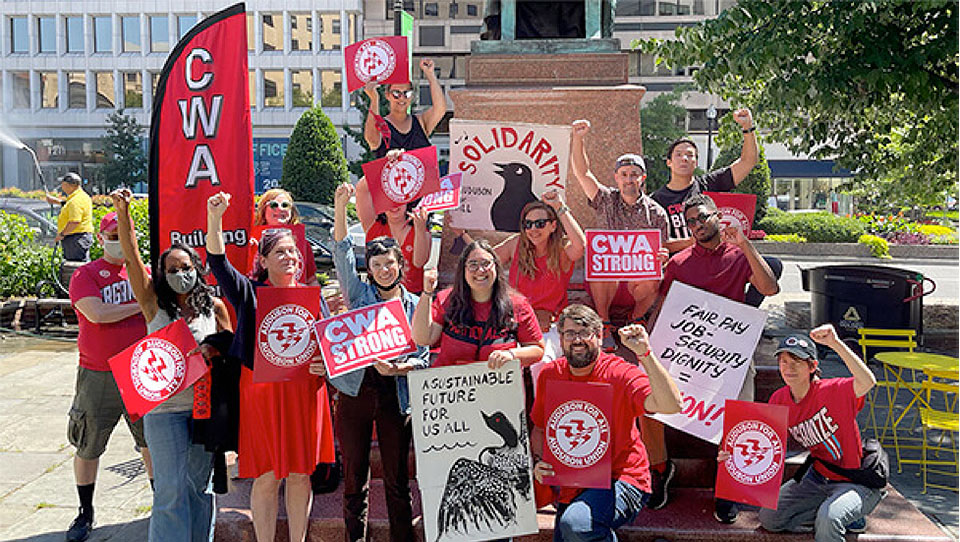
NEW YORK and WASHINGTON (PAI)—Can you imagine a national pro-wildlife, pro-environment non-profit organization firing 100 of its staffers on Earth Day?
The National Audubon Society did so to its field staff this past April. The combination of two rounds of firings—including that one–management turmoil and a “toxic work culture” at the nationwide organization for bird-watchers has led staffers to organize into the Audubon For All Union and try to become members of the Communications Workers.
The result: A formal union certification election filing with the National Labor Relations Board on July 1, covering 124 remaining workers at Audubon’s national offices in New York City and D.C., but not its directors, supervisors, guards, HR employees, or employees of Audubon’s state and regional affiliates and nature centers. Ballots will be opened August 27.
“Much of our organizing was prompted by the two rounds of layoffs,” starting with the one on Earth Day, worker Maddox Wolfe, a fundraising campaign manager and one of the drive’s organizers, told Press Associates Union News Service in a telephone interview. “The Earth Day layoffs affected workers at our nature centers who interface with the public.”
Those workers around the U.S. aren’t in the bargaining unit, but their vulnerability alerted the headquarters workers to their own peril, too. “We saw this (layoff) as ‘a truth moment’ in which workers really needed support,” Wolfe said.
The chaos at the society didn’t stop Audubon’s new CEO from hiring notorious union-buster law firm Littler Mendelson to stop CWA’s organizing drive even before the workers delivered their certified majority of signed National Labor Relations Board election authorization cards, and sought card-check recognition. The CEO flatly refused. She also pledged society neutrality during the drive, then reversed course.
The Audubon workers also discovered another key fact workers at other non-profits, especially progressive ones, realize: You may be working on a mission—in their case bird and wildlife habitat conservation—but you’re still a worker.
Besides, Wolfe said, “Being organized and having a union will help better our mission.”
“This has been an extraordinary year and a half for everyone” as the coronavirus pandemic shut Audubon’s two headquarters, forcing everyone to work remotely—and forcing the layoffs, she reflected. “It really demonstrates the strength and resilience of Audubon workers to organize” even as the modern-day plague spread coast to coast.
Union organizing has also fostered a “sense of collegiality” across Audubon, stretching from the headquarters to the field, she noted. “We were siloed in the past” with headquarters workers having little contact with field workers, Wolfe explained. “I have met and now know colleagues from across the country.
“We’re creating a stronger mission and a stronger organization,” she added.
And Audubon For All notes that collegiality extended to society members. Once the workers went public with the unionization drive, more than 10,000 members petitioned headquarters in favor of the union. Pro-worker comments from Audubon Society members are posted on the union’s Instagram page.
In its statement about the organizing drive, Audubon For All also cited management’s decision to ignore workers’ voices, its lack of transparency, top-down decision-making, unfair treatment of women, and a health care cost hike imposed on workers in the middle of the coronavirus pandemic. An independent audit uncovered an Audubon “culture of retaliation, fear and antagonism” towards workers of color and female workers.
“I’ve seen several of my coworkers let go with zero warning and watched my health premiums go up—all during a pandemic,” grant accounting department manager Safiya Cathey told CWA in their release.
“I want to be focused on combating climate change and saving birds’ habitats, not whether I’ll be able to afford a doctor’s visit. In order to fight for the birds, we need to fight for ourselves, which is why this union is so important.”
Since the drive began, the workers also had a chance to reflect on changed conditions: They re-entered the D.C. office earlier in August, to deliver the pro-worker petitions. It was their first time there since the pandemic began, Wolfe said. The delivery occurred after workers held a nearby and cheerful public demonstration. They’re excited and optimistic about the balloting.
“We were different people than when we had left” more than 14 months before, she added. “We got up to the offices and it was dead silent. Even management had left.” The workers left the petitions from Audubon’s members on a top officer’s desk.
The Audubon workers aren’t the only ones in a conservation-minded non-profit group who are unionizing. Office and Professional Employees Local 2 recently announced the NLRB is close to setting a voting date for Defenders of Wildlife staffers. “We’re incredibly excited to be moving forward,” worker Kelly Russo said.
And, unlike Audubon, the Tucson-based Center for Biological Diversity agreed to card-check recognition for its workers, who will be joining CWA Local 9415.
“Joining the labor movement makes the Center for Biological Diversity an even stronger advocate for threatened communities, wildlife, and wild places. At this pivotal moment for our planet, we’re standing with workers against big polluters and other powerful interests,” the Workers for Biological Diversity Organizing Committee told CWA. “We’re stronger when we band together. And we want to thank our partners at the Communications Workers of America for helping us elevate and amplify our work.”












Comments